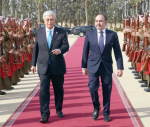You are here
Economic repercussions of the Russian-Ukrainian crisis
Feb 28,2022 - Last updated at Feb 28,2022
This Russian-Ukrainian crisis came at a time when the world was close to getting out of the consequences of the global Corona pandemic, which negatively affected the global economy as a result of major closures, stopping production operations and cutting supply chains. The Russian-Ukrainian crisis has reminded us of the extent of interdependence and complexity in the global economy to confuse the global economic scene once again with its various main markets. The crisis also reminds us that global security is interconnected, especially with regard to food security, energy security and human security, and that the types of weapons used in wars go beyond conventional military weapons, to reach the weapon of economic sanctions.
It is too early to assess the repercussions of the crisis on the world in general and the Arab world in particular as conditions on the ground are rapidly evolving and changing. However, we can read the immediate effects that began to appear on some global economic indicators, and on various markets. Then, we try to extrapolate the future of those variables after analysing the volume of interdependence between the economies of the two countries and other countries of the world, especially our Arab region.
On the level of oil and gas markets, oil prices crossed the threshold of $100 per barrel, for the first time in years, and gas prices in Europe followed it up by 35 per cent during the first trading hours after the outbreak of the crisis. Prices of gas futures exceeded the level of $1,400 per 1000 cubic metres. The impact of the rise in oil and gas prices will be positive on the financial revenues of the Arab countries producing and exporting these two products. As for the oil-importing countries, the impact will be negative in the form of an increase in the oil bill, depletion of foreign reserves, high inflation rates, production costs and an increase in the burden of government support for the poor.
Also, high inflation rates would exacerbate the dilemma faced by central banks worldwide. While high inflation rates are pushing central banks to raise interest rates, the expected economic slowdown caused by the crisis will press toward keeping interest rates low to encourage economic growth.
On the other hand, what is currently being raised is the possibility that some Arab oil and gas producing countries, such as Saudi Arabia, Qatar and Algeria, will replace Russia to compensate European markets for the possible shortage of stopping supplying Russia with oil and gas, especially if the sanctions include oil and gas in the future. This possibility is not easy in the short term, at least, because it requires major arrangements at the level of contracts, supply chains and logistical levels in importing countries.
In terms of stock markets, global stock prices and stock futures declined in varying degrees after the opening sessions that followed the entry of Russian forces into Ukrainian territory, but they corrected themselves on Friday. Naturally, tensions will be less severe in international financial markets, as Russia and Ukraine are not major players in those markets.
On the other hand, the spot gold price jumped to its highest level since late 2020, as a result of the influx of investors into safe haven assets, in light of the global stock markets plunging into the red zone.
With regard to the currency markets, they interacted with field developments, as the Russian Ruble witnessed its largest losses for the first time since 2016, and reached its lowest level against the US dollar and the euro.
In terms of food security, about 14 Arab countries depend on Ukrainian and Russian imports for more than 20 per cent of their wheat consumption, which puts them in front of a potential food insecurity crisis if the free movement of transport is obstructed, and this reality constitutes a source of concern for these countries. For example, Egypt imports 60 per cent of its wheat needs from Russia and 30 per cent from Ukraine, while Algeria imports 25 per cent of its wheat needs from Russia and Morocco imports 26 per cent of its wheat needs from Ukraine. If the Ukrainian ports are spared the targeting, the production pace will decrease, especially if the war is prolonged.
With regard to the sanctions, their impact will be evident in the event that the economic sanctions include the energy sector (oil and gas), then the Europeans and their American ally may consider the Arab gas and oil producing countries, such as Qatar, Saudi Arabia and Algeria, as a source that can compensate for some of the shortfall in gas and oil supplies to Europe and a source to prevent a sharp rise in world oil prices by increasing their oil production.
We do not know the size of Arab investments in Russian securities and bonds, which may be affected by the sanctions imposed on these securities and the profits derived from them, especially if Russia’s access to Swift’s service is cut off.
As for the effects on the aid programs for refugees in the Arab countries, the impact of the flow of refugees from the war zone to the European Union countries could put pressure on the global aid programme for refugees that benefits the refugees of the Middle East and North Africa countries. We pray to God that peace prevails and the voice of peace prevails in the whole world.
The author is economic, banking and financial expert based in Amman.













